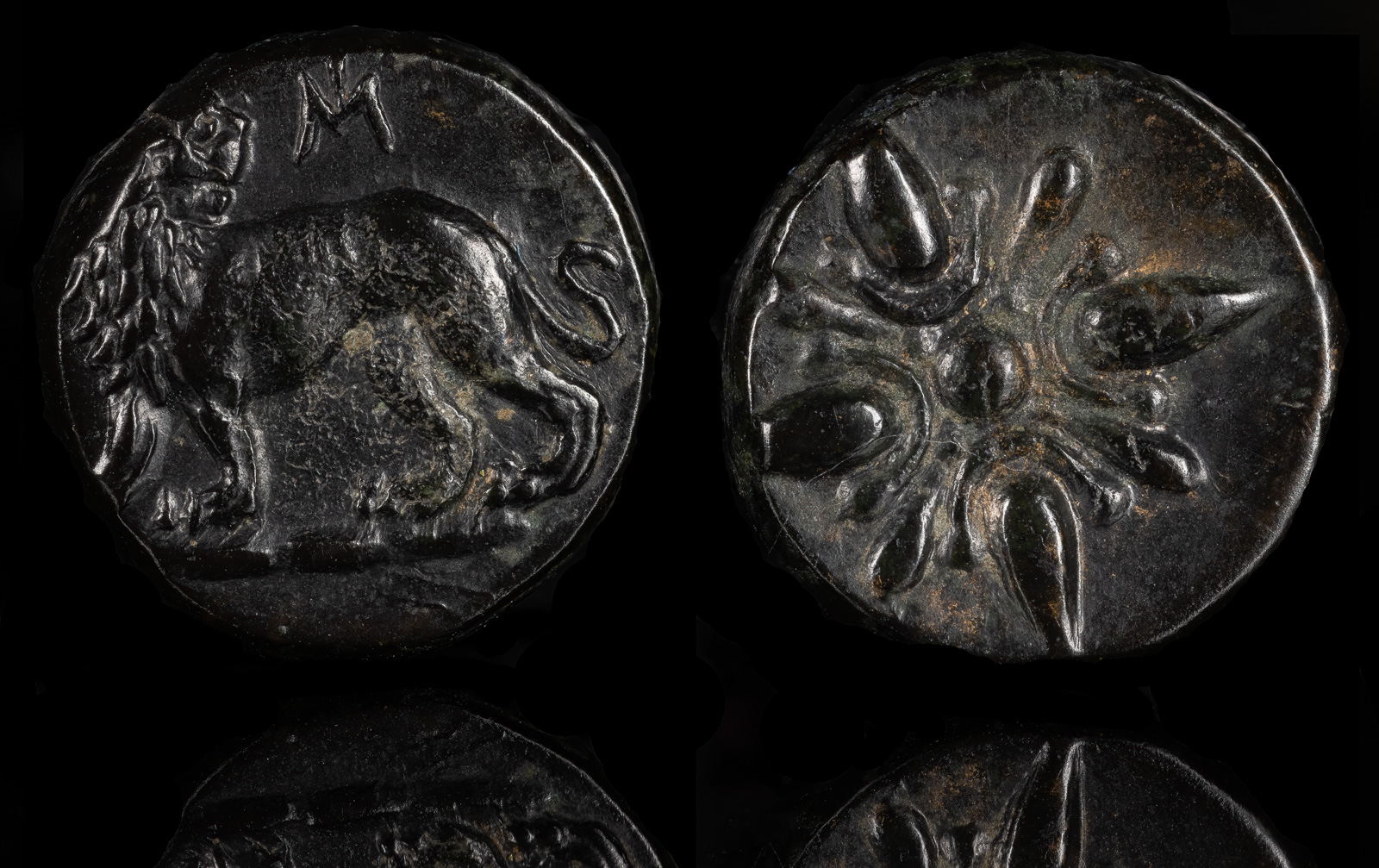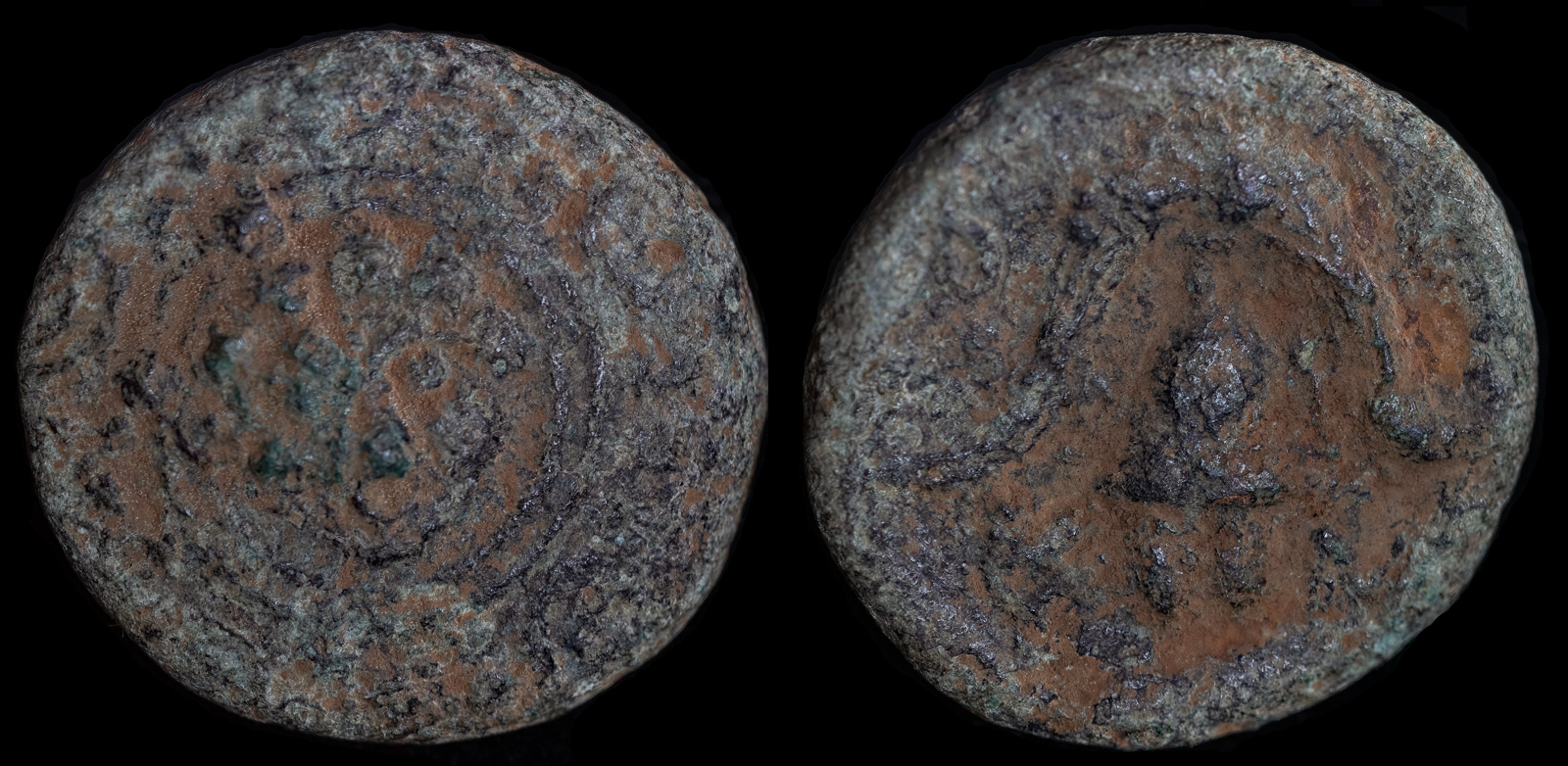
IONIA. Miletos
Circa 350-325 BCE
Bronze, 11 mm, 2.38 g
Lion standing left, looking back; above, monogram of Miletos. Rev. Stellate pattern. Deppert-Lippitz 297-303. Weber 6041
Ex J. Metzger Collection
Ex Nomos
Perhaps no other city touches as many of the Diadochi as Miletos. It started as Alexander‘s first major siege with the Persian Empire. Philotas, who Alexander would later execute for treason, played a key roll in preventing the Persian navy from being a factor.
After Alexander died, Miletos was passed among the various Diadochi. It first came under Ptolemy, who was the governor of Caria, and who ruled it through his satrap Asandros. Later, Antigonos Monophthalmos seized the city, and after he died in battle it was under Seleukos Nikator.
In 295 BCE, Miletos was allied with Demetrios Poliorketes and Ptolemy Soter (who had joined in a marriage alliance), but was threatened by Lysimachos. Demetrios‘ good fortune ended there when in 286 BCE he was forced to surrender the city and imprisoned, after which Miletos fell to Lysimachos. Of course, Lysimachos didn’t hold it for long, as it was taken back by Seleukos Nikator in 281 BCE.
When Seleukos was murdered by Ptolemy Keraunos, the city went to his son, Antiochos I. Finally, it was seized from the Seleukids by Ptolemy II Philadelphos, where it remained until roughly the Roman ascendancy.
Therefore, Miletos is easily the most symbolic city of my Philip II, Alexander III, and the Era of the Diadochi collection, since it was touched by nearly all of them.

KINGS of MACEDON. Anonymous
Miletos(?) ca after 311 BCE
15.02mm 3.46g
Obv: Macedonian shield, boss decorated with facing gorgoneion.
Rev: Macedonian helmet; B-A across fields; below, monogram to left and right.
Price 2069;SNG Copenhagen -, cf. 1122ff (larger denomination); HGC 3.1, -, cf. 966 (grain ear on rev., Salamis); cf. CNG 41, 319
According to Aristobolos of Kassandreia, “there is a spring in Miletos referred to as the Achilleion and that the water that comes out of it is entirely fresh, but a layer of saltwater is on top of it.”
Diphilos of Siphnos, who lived during the time of Lysimachos, proclaimed the cherries of Miletos as the best.
Miletos begins to be inhabited.
Miletos is inhabited by Minoans.
Miletos is overrun by mainland Greeks.
Mycenaean settlers occupy Miletos.
Transition phase in Miletos. Both phases are Mycenaean.
Miletos comes under Hittite control.
Miletos is destroyed by some unknown people.
750 BCE
Amisos founded by settlers from Miletos.
Sinope is founded by settlers from Miletos.
Kyzikos receives colonies from Miletos.
Settlers from Miletos colonize Ikaria.
Parion is founded by settlers from Miletos.
Phasis is founded by settlers from Miletos and named for its nearby river.
Prokonnesos is founded by settlers from Miletos.
Artake is founded by settlers from Miletos.
Additional settlers from Miletos migrate to Kyzikos.
Abydos founded by settlers from Miletos.
Magnesia ad Maeander is rebuilt by settlers from Miletos or Ephesos.
Approximate time when Thrasybolos, tyrant of Miletos, fights a lengthy war against Lydia and maintains the independence of Miletos.
Olbia is founded by settlers from Miletos.
Kardia founded by settlers from Miletos and Klazomenai.
Additional settlers from Miletos move to Sinope.
Istros founded by settlers from Miletos.
Kios is founded by settlers from Miletos.
Apollonia Pontika is founded by settlers from Miletos.
Pantikapaion is founded by settlers from Miletos.
Kardia is founded by settlers from Miletos and Klazomenai.
Apollonia ad Rhyndakum is founded by settlers from Miletos.
Approximate foundation of Odessos by settlers from Miletos.
Approximate foundation of Myrmekion by settlers from Miletos.
Approximate foundation of Nymphaion by settlers from Miletos.
Approximate foundation of Theodosia by settlers from Miletos.
Approximate foundation of Tyra by settlers from Miletos.
Approximate foundation of Dioscurias by settlers from Miletos.
Aristagoras of Miletos asks Athens for help in the Ionian Revolt.
Histaios of Miletos founds the city of Myrkinos, on the site of what later would be Amphipolis. Aristagoras, also of Miletos, would later occupy the city and perish in the siege of a nearby town.
The Battle of Lade is fought between the Ionians under Dionysos of Phokaia and the Persians. Chios has the largest contingent, followed by Miletos, Lesbos (probably Mytilene), Samos, Teos, Priene, Erythrai, Myos, and Phokaia. Most fled during the battle, but the Chians put up a bold resistance before defeat.
Peace of Kallias, an agreement between Athens and Persia after a series of conflicts between them. In Cyprus, Amathos, Kelenderis, and Salamis remain under Persian control but maintains its local autonomy. Ephesos, Miletos, Priene, Klazomenai, and Phokaia also obtain some autonomy.
Ptolemy II Philadelphos sends Ptolemy Epigonos to Miletos on business.
Ptolemy Epigonos and the tyrant Timarchos of Miletos revolt against Ptolemy II Philadelphos.
Miletos is taken by Antiochos II Theos and its tyrant Timarchos is killed. The rebellion with Ptolemy Epigonos against Ptolemy II Philadelphos ends.
The Second Syrian War ends. Ptolemy II cedes land to Antiiochos II and Antigonos II remains in mastery of Greece. Antiochos II takes control over Ephesos, Samos, and Miletos.
Livius is sent to Anatolia and the cities of Miletos, Myndos, Halikarnassos, Knidos, and Kos are friendly.